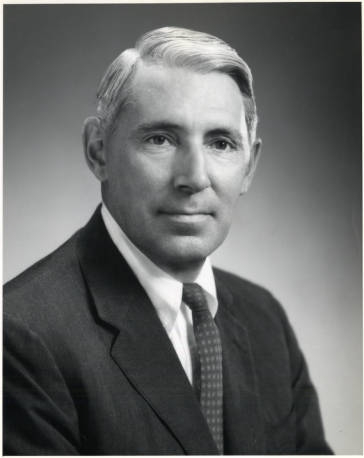James Isbell Armstrong

Back to Middlebury History Online
President James Isbell Armstrong, the 12th College president (1963–1975) served during a turbulent period in U.S. history, a time marked by war abroad and assassinations at home. Campus had student unrest, social change, and financial stringency. Yet when Armstrong left office, he’d established Middlebury as one of the top liberal arts colleges in the country.
Armstrong instituted the first tenure system at Middlebury, initiated a faculty research fund, created a professional leave program, enlarged faculty size, increased faculty salaries, reduced teaching loads, and directly helped shape curriculum and academic policy. The faculty he hired brought a new standard of excellence to the campus and helped transform the expectations of existing Middlebury faculty.
In his inaugural address, delivered on November 8, 1963, Armstrong said: “There is no room in this hour of man’s history on earth for luxury education with finishing-school overtones, for fads, frills, and fringes.…The colleges of the liberal arts and sciences must raise up men and women who think and act…Its teaching is of knowledge which keeps advancing: each day, each month, each year the horizons are receding. The direction of advance is clear; the goal is infinite.”
Armstrong immediately embarked on an ambitious fund-raising effort, and within three years, the College had raised $8.3 million. The Armstrong administration built Sunderland Language Center (1965), Johnson Memorial Music and Art Building (1968), the Science Center (1968), the four dormitories Kelly, Hadley, Lang Milliken (1969–1971), the Social-Dining Units (later the Freeman International Center) (1970), and Fletcher Field House (1974). Major renovations included converting Carr Hall to an infirmary, and adapting four other buildings—Voter, Warner, Munroe, and Old Chapel—to accommodate Middlebury’s growing numbers of undergraduates, faculty, and staff.
Armstrong also added the Chinese (1966) and Japanese (1970) Language Schools, as well as adding undergraduate courses to the Schools Abroad program. In addition, in 1971, Armstrong and the trustees launched the 175th Anniversary Campaign, which raised more than $13.8 million.
Middlebury awarded Armstrong the honorary degree of doctor of letters in 1977, and in 1999 the College named the science library in the new Bicentennial Hall in Armstrong’s honor. Middlebury later established the James I. Armstrong Professorship in Classical Studies in 2010.
Here, an excerpt from a glowing tribute delivered at President Armstrong’s final faculty meeting in 1975: “By good management, prudence, and ferocious fundraising, he led us through a period of expansion when this college grew in size, in endowment, in every facet—but most of all in quality.…So, Mr. President, somewhat immodestly, we [the faculty] believe the greatest tribute to your years at Middlebury stands before you in this room.”

